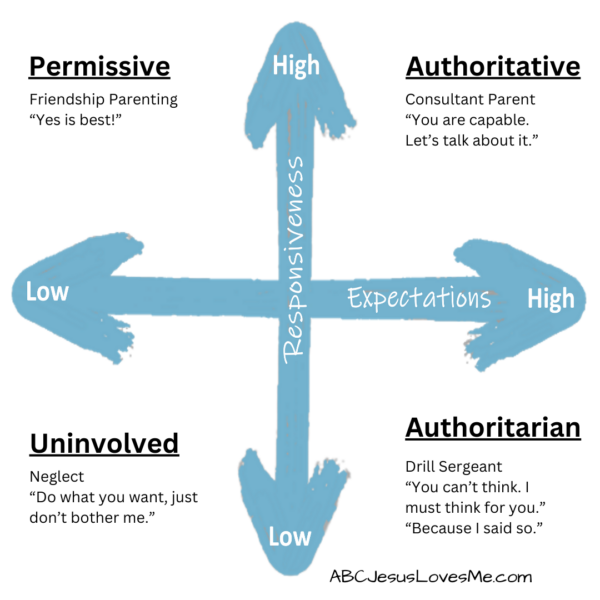As a parent, you’ve probably wondered how to instill respect in your children—especially when you notice them showing more respect to others than to you. It’s a common struggle, and one that Jessica, a listener of our Parenting to Impress podcast, recently asked about. After viewing the Grace and Truth Discipline video series, she noticed that her kids seem to respect her husband more than her and wondered if it has something to do with her more permissive parenting style. This question got Melanie and I thinking deeply about respect, parenting styles, and how we can model and teach respect to our children.
Read this podcast episode’s transcript…

Understanding Respect
It’s easy to focus on teaching obedience, often citing verses like “Honor your father and mother” or “Children, obey your parents.” But what about respect? When we talk about respect, our minds might immediately go to the authority figures outside the home—police officers, teachers, and judges. But what about respect within our families?
Respect is more than just obedience; it’s about valuing others as image-bearers of God. In Genesis, we learn that all people are created in God’s image, which means every person is worthy of respect. This truth extends beyond the home and into every relationship our children will have.

Reflecting on Parenting Styles
Jessica’s question also touched on her self-described permissive parenting style. This is one of the four common parenting styles—uninvolved, permissive, authoritarian, and authoritative. Each of these styles influences the level of responsibility given to the child and, as a result, shapes how they learn to respect others.
- Uninvolved Parenting: This is the “do whatever you want, just leave me alone” approach. It’s often associated with neglect.
- Permissive Parenting: Permissive parents tend to prioritize being their child’s friend. They often say “yes” as much as possible, working to avoid frustration in the child’s life. While this can create a seemingly happy environment, this facade will not foster the respect that grows out of healthy boundaries and expectations.
- Authoritarian Parenting: This is the “Because I said so” approach. It’s strict, with high expectations, but lacking the warmth or guidance to help children understand life’s why’s and grow into a confident adult. Respect in this environment might be more about fear than true honor.
- Authoritative Parenting: This is the balance between warmth and discipline. Authoritative parents are like coaches—they guide, listen, and encourage, but they also set clear boundaries and expectations. Biblical authoritative discipline points the child back to God’s Word as the authority of truth. This approach helps children learn to respect others and themselves.

Modeling Respect
Respect starts with us, the parents. We can’t expect our children to respect us or others if we don’t model it ourselves. How do we talk to our children or our spouses? How do we discuss our government or church leaders? Our children are always watching and learning from our example.
Respect also involves recognizing that our children are not the center of the universe. This can be a tough lesson, especially in a culture that often promotes the idea of “me first.” Teaching our children to serve others and to consider others’ needs above their own is a crucial part of instilling respect.

Practical Ways to Teach Respect
- Teach Active Listening: Encourage your children to listen actively, make eye contact, and respond thoughtfully. This shows that they value what others have to say. For older children, this often means putting down the phone or taking out the ear buds.
- Give Them Responsibilities: Provide opportunity for your children to take on age-appropriate responsibilities. This not only teaches them respect for the tasks and people involved but also for themselves.
- Model Respect in Your Relationships: Whether it’s how you talk to your spouse, your neighbors, or even the stranger at the grocery store, your children are learning from you. Show them what respect looks like in every interaction.
- Discuss and Reflect: Take the time to talk with your children about respect. Ask them what they think it looks like and how they can show it to others. Reflect on their experiences and help them understand the importance of respecting everyone as God’s creation.
Jessica, thank you for these heartfelt questions. It’s such a good reminder to all of that that teaching respect is not simply demanding it but living it out every day. By modeling respect, setting clear expectations, and guiding our children with love and wisdom, we lay the foundation for them to grow into respectful and godly adults.

New Parent and Teaching Training Opportunity in Mississippi:
You are invited to an upcoming training on biblical discipline and teaching tips. Join parents and teachers this fall.
- September 12, 2024 near Atlanta, GA
- October 4-5, 2024 near Austin, TX
- November 1-2, 2024 in Vicksburg, Mississippi
Learn more and register now.

Also, we have to model respect to our kids by treating THEM with respect. If they only see us model it to other adults but not to them, they will be resentful and will not respect us.
Maggie – Absolutely. We talked about this in the podcast, but I failed to include it in the blog post. Thank you for the reminder. –heidi